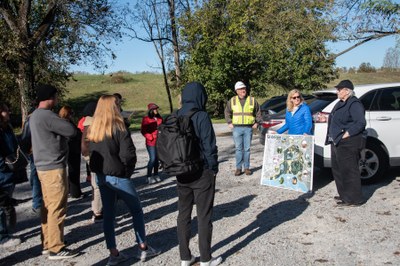Cores
Administrative and Research Translation Core

The Administrative Core of the Louisville Superfund Center (LSC) provides administrative and fiscal support to all Projects and Cores supported by the Center. The Core acts as a liaison for individual Center members in order to best promote collaboration, to ensure all Center work effectively contributes issues relevant to the SRP. The Core also disseminates scientific knowledge acquired from the University of Louisville Superfund Research Center (ULSRP) in a timely manner to key constituencies in forms that are targeted and useful to our audience. These include scientists and public health professionals; local, state, and federal policy makers; and the media and press. To assist in the planning and coordination of research and core activities the Core personnel organize scientific work-in-progress sessions, monthly meetings, relevant focus groups, and frequent formal and informal interactions. To integrate cross-disciplinary research, the Core provides leadership and administrative support needed for integration and coordination of research. The Core leverages existing resources on campus to optimize the productivity of the Center and seeks input from both an Internal Advisory Committee and an External Advisory Committee in evaluating progress and in maintaining the relevance of Center activities to the Superfund Research Program mandate. Core leaders maintain close contact with NIEHS program officials and with UofL administration. Core administrators also manages the finances and resources of the Center to optimize usage and appropriate allocation. They also coordinate the timely development of progress reports and financial statements. To ensure quality management, the Core monitors and facilitates attainment of Center objectives in research, training, education, and community engagement, and ensures compliance with state and federal regulations. The Administrative Core is the go-to place for students and trainees, community members, public media and press so that all such activities can be appropriately facilitated and coordinated. The Research Translational lead of ULSRC, Dr. Ted Smith has also established a web portal- Louisville Data Commons (https://linktr.ee/louisvilledatacommons), an online data repository available to anyone interested in the state of our local environment or involved in citizen science or related data-gathering projects.
Research Experience and Training Coordination Core

The RETCC has played a coordinating role in the success of ULSRC since its inception in September 2017. By working closely with other NIEHS-supported training programs at the UofL (T32ES011564; T35ES014559), the RETCC has developed a rich, diverse, and comprehensive training program that is both multidisciplinary and inclusive. In addition to the course work and ‘on the bench’ training activities, RETCC routinely organizes participatory field trips to the Lee’s Lane Superfund site to better understand and appreciate health concerns of residents in the adjacent community of Riverside Gardens; facilitates the meeting of trainees with regional Superfund site coordinators and officials and the Metro Louisville Public Health and Wellness Department. Our training core in collaboration with Superfund Research Centers at Duke University, University of Kentucky, and University of Pennsylvania organized a trip to Washington, D.C. so trainees could attend a Science and Policy Institute meeting that included interactions with congressional leaders and their staff. Such activities have been instrumental in the well-rounded growth of our trainees. Moreover, these trainees not only provide “the force that turns the wheel” but also are the focus and hub of intellectual crosstalk and fertilization across projects, cores, other SRCs and the National SRP. To date, ULSRC success is the product of our trainees’ successes through their many accomplishments including publications, presentations, awards, degrees, fellowships, interactions with community partners, and environmental health sciences-related career opportunities. Thus, although we are proud of our current success via integration of trainee activities across the ULSRC, we continue to strive to build on these successes by implementing innovative and unifying features into RETCC-directed activities that focus on fulfilling the goals and furthering the success of our trainees.
Community Engagement Core

Residents of Kentucky and Louisville suffer disproportionately from many chronic diseases and exposure to toxics in their environment. Dangerously high rates of obesity, hypertension, diabetes, and cancer in Kentucky have been well documented. Louisville, Kentucky’s western and southwestern neighborhoods are home to a disproportionate number of industries that are major sources of toxic air emissions, numerous brownfields, the Lee’s Lane Landfill, poor access to greenspace, inadequate transportation, a lack of affordable safe housing, and limited access to healthy food options. These conditions intersect to produce increased health risk burdens. This means that understanding how exposures to VOCs in Kentucky in general, and in Louisville particularly, affect the occurrence or severity of cardiometabolic related diseases is crucial. In addition, people at risk of VOC exposure carry additional health risks based on the root causes of health disparities such as structural racism and poverty. The ULSRC research project’s geographic areas of focus are determined by our findings that show that there are multiple “hotspots” in Louisville with high concentrations of VOC exposures; these hotspots are found in proximity to the Lee’s Lane Landfill and in the Oakland neighborhood. Project 1 also proposes to test for evidence of VOC exposure in proximity to the Distler Farm Superfund site where high levels of these compounds are suspected. While the people who live in these areas are central to the ULSRC focus, the CEC also focuses on working with the organizations and agencies that serve and represent these communities. Thus, the CEC overarching goal is to support transdisciplinary research that incorporates best practices in community engagement by facilitating beneficial and bidirectional interactions between residents, industry, policy makers, and Superfund Center investigators, building all partners’ and interested parties’ capacity to collaboratively understand, reduce exposure to, and address the negative impacts of contaminants from Superfund sites and other sites impacted by hazardous waste, especially VOCs.
Metabolism and Toxicity Core

The overall purpose and the function of the Metabolism and Toxicity Core is to provide high quality analytical services and validated data in support of all projects at the University of Louisville Superfund Research Center. The Core personnel conduct measurements and assays of biomarkers and indices of cardiovascular, metabolism, and hepatic function used for assessing the risk and progression of cardiometabolic disease upon exposure to volatile organic compounds (VOCs). The Core personnel also provide intellectual input and advice in selection of specific methodological approaches and provide training to students, fellows, technicians, and junior faculty. The Core employs strict quality control procedures to validate data and generate harmonized data reports and data dictionaries to be stored in the Data Management and Analysis Core. The Core supports all Superfund Center research projects through its state-of-the-art equipment and assay. The support offered by the Core encompasses three main components – a flow cytometry component for the detection and characterization of circulating cells and microparticles; a metabolism component for measuring biochemical and metabolic endpoints such as urinary metabolites of VOCs, bile acids and catecholamines by LC/MS/MS and GC/MS; and a pathology component to assay systemic toxicity using a battery of tests relating to glucose control, liver function and hepatic toxicity. However, the scope of the core exceeds that of the projects to encompass the development of cutting-edge techniques and analytical platforms to expand its repertoire of services. The Core continually upgrades its infrastructure as well as its technical capabilities to remain at the leading edge of assays relating to biomarkers of exposure and harm. The core is also committed to the continued education of its users as well as the research community at the university. The Core will also disseminate educational information regarding the potential utility and accessibility of its services to enhance environmental health research. By ensuring central deposition of harmonized and validated data, the core provides a firm foundation for research not only by the University of Louisville Superfund investigators, but investigators at other Superfund Centers as well. Because of its state-of-the-art equipment, highly sophisticated technologies, and skilled technical personnel, the Core provides premier toxicological and clinical pathology services. By meeting these goals, the core continues to be an essential vehicle for growth and innovation within the Center, as well as an educational hub for the training the next generation of scientists in the field of environmental health research.
Data Management and Analysis Core

The primary objective of the Data Management and Analysis Core (DMAC) is to provide statistical support and data management and storage capabilities to all components of the University of Louisville Superfund Research Center (ULSRC). The functions of the Core are matched to the needs of each project and cover a full range of services from collaboration and routine service to protocol preparation to procedural review and oversight. The Core is charged to provide two main services: establish a repository for the long-term storage and archiving of data; and assist Center investigators in the statistical analysis of their results. The core assures the authenticity and quality of these specimens, and it prepares these samples for long-term storage, or dispense samples as needed. The Core also provides scientifically valid and rigorous statistical analysis of data and support the development of innovative methods to enhance the basic and translational research efforts of Center investigators. It provides state-of-the-art biostatistics and bioinformatics expertise and analytical support. Core biostatisticians develop new statistical methods, such as quantitative risk assessment models, multipollutant exposure analysis, and land-use regression models, for estimating cardiometabolic disease risk in exposed populations and for the analysis and evaluation of exposures and health effects. In collaboration with other projects and cores, DMAC, statisticians harmonize the data by defining standards (e.g., creating searchable data dictionaries and defining variables relevant for each project. In the next funding cycle, we will continue to use these procedures. The Core serves as a unique educational resource for training graduate students, post-doctoral fellows, residents and junior faculty and in collaboration with the Training and Administration Cores. This Core allows Center investigators easy access to high quality, centralized data management and statistical services, and thereby will strengthen the organizational cohesion of the Center. This comprehensive and integrated service permits one or more biostatisticians to be involved from the initial planning stage of a project (when statistical consultation is most beneficial) throughout its implementation, analysis and completion. The Core provides a stable and collegial environment that fosters long-term working relationships between biostatisticians and investigators and continues to promote sophisticated approaches to experimental design and analysis. The biostatisticians of this Core are knowledgeable about clinical research and have broad expertise in statistical applications for epidemiological investigations, clinical trials, pre-clinical studies, and prevention and control research. Their interdisciplinary interactions with basic scientists and clinical investigators adds a new dimension to the interpretation of experimental results, one that is only possible when collaborators share a mutual appreciation of problems and issues. With these goals in mind for the DMAC, in August 2019 they hosted a Data Mangement and Data Interoperabilty Workshop in collaboration with Microsoft. Follow this link for more information about that event.